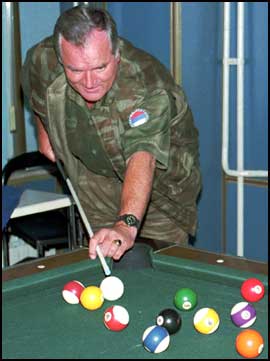BBC asks: Will General Mladic face kangaroo court?
 He is hiding on a hill in central Serbia. He is in an underground military base in eastern Bosnia. He is travelling around the Former Yugoslav Republic of Macedonia. Or he is relaxing, having a coffee, in his flat in Belgrade. Just some of the locations war crimes suspect, General Ratko Mladic, has been associated with during the past few weeks.
He is hiding on a hill in central Serbia. He is in an underground military base in eastern Bosnia. He is travelling around the Former Yugoslav Republic of Macedonia. Or he is relaxing, having a coffee, in his flat in Belgrade. Just some of the locations war crimes suspect, General Ratko Mladic, has been associated with during the past few weeks.The question that really matters is: does the Serbian government know where he is? Gen Mladic, 64, is charged with genocide for his role during the 1992-95 Bosnian War. Along with his former political boss, Radovan Karadzic, he is Europe's most wanted man. He disappeared from public view about four years ago following the overthrow of his former mentor and Yugoslav president, Slobodan Milosevic. There is no doubt that the Serbian government has stepped up its attempts to track down Gen Mladic in recent weeks, as pressure from the European Union and the UN war crimes tribunal in The Hague, has grown. Search intensifies The authorities in Belgrade have arrested known associates; the defence ministry has carried out its own internal inquiry and admitted members of the armed forces had protected the general in the past; the security forces are said to be carrying out operations on a "daily basis".
Just this weekend, a minister said they had identified a network of 130 people who had been protecting the general. But, as yet, no sign of the man himself. And no one is saying whether contact has been made with the general. And no one is saying whether his former associates, undergoing interrogation, are spilling the beans about his location. In fact, there is a deafening silence from the authorities. A veil has been drawn over what is happening. And there may be good reason. Complex situation Many Serbs still regard Ratko Mladic as a national hero. If he is killed in a bloody shoot-out with Serbian security forces, there could be a strong reaction from nationalists. Serbia is run by a coalition government. Political instability is just around the corner.
Prime Minister Vojislav Kostunica would certainly rather see a dignified surrender from the general. And that might be why everything is taking time, giving him space to make his own mind up to come in from the cold. The question is, what happens if he decides not to? Will the security forces be sent in? How is all this playing out with the Serbian people? Whilst there are many who still see Gen Mladic as a hero who should never be surrendered to The Hague, there are many who are just sick and tired of the whole affair and want it settled once and for all. And all this at a time when Serbia faces two other critical political events. Later this month the people of Montenegro, which forms part of the federation of Serbia and Montenegro, will hold a referendum on whether to become an independent state. And bubbling along in the background is the potential powder keg of Kosovo as it embarks on talks about its final status.
leave a response